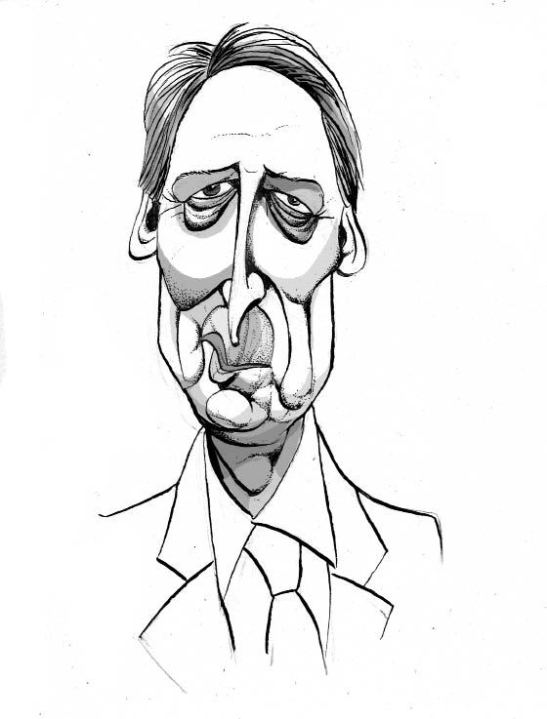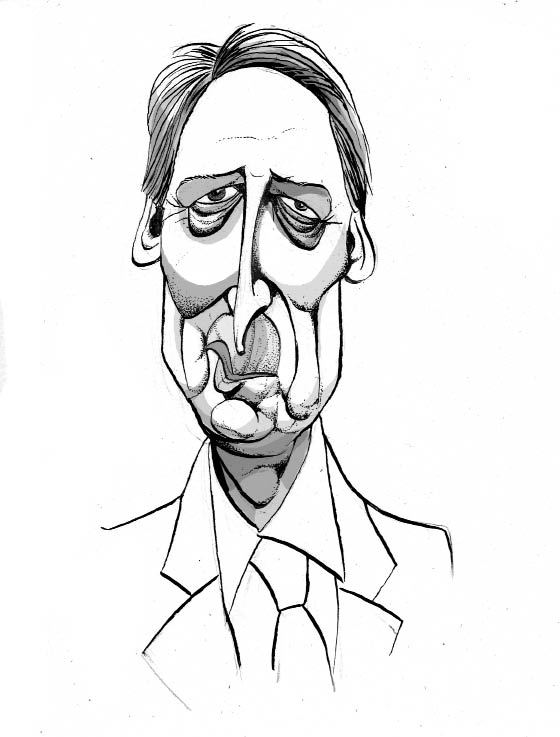On the table outside Phillip Hammond’s office is a red box with the words ‘Secretary of State for Transport’ embossed in gold. Realising it has caught my eye, Hammond opens it up — it’s empty, as befits a diligent minister. I ask if he follows the ‘Yes Minister rule’ — starting at the bottom to see what his department doesn’t want him to read. I expect him to smile but he looks puzzled, then explains methodically that he takes all the papers out and sorts them in order of importance.
This rather sums him up: Mr Efficiency. He even walks in an efficient way, his long legs taking sensible strides and his arms swinging just enough.
Until the Conservatives fell short of an overall majority, he was also the party’s Mr Efficiencies. As shadow chief secretary to the Treasury, Hammond was charged with working out how the Tories would bring the deficit under control. The ease with which Hammond took charge of this most demanding of briefs showed why he had made so much money in business before entering politics. Media reports have him as the richest member of the Cabinet, with an estimated fortune of £7.1 million.
If it weren’t for the coalition, Hammond would be Chief Secretary. But the coalition requires a Liberal Democrat to do that job so he instead finds himself as Transport Secretary. Hammond has taken this like a good soldier. But when I ask him if he considered defecting to the Liberal Democrats on hearing that David Laws was going to resign as Chief Secretary, he shoots back, ‘If I had been a Liberal Democrat I would have been there before him.’ Before going on to say, ‘I am a very open-minded person but one of the things I have never considered is defecting to the Liberal Democrats.’
Hammond hasn’t shed the chief secretary mindset, though. As I look around the room at the pictures on the wall, a series of posters from the golden age of travel, Hammond points out that it is Lord Adonis’s selection of artwork and that in the days of opposition he had put down a parliamentary question to find out how much Adonis had made the department spend on them: about £700. Hammond, who is still watching the pennies, won’t be having the department buy him new pictures. Instead he’ll borrow some pieces from the government collection.
During the election campaign, the Tories made much of the British Airways strikes, talking about a new militant tendency being fostered by Gordon Brown’s union fixer Charlie Whelan. Hammond has a double interest in the strike; many of the cabin crew live in his Surrey constituency. He says that the strikers need to adjust to the modern world: ‘the truth is, unless British Airways — management and employees — can find a way to respond to the competitive challenge they won’t survive.’
The other immediate issue in Hammond’s in-tray is the ash cloud, which has proved even more disruptive to passengers than the BA strikes. The problem, apparently, is that the volcano is spewing out the wrong kind of ash — ‘smaller particles’ — which means that there isn’t data on when it’s safe for planes to fly. The airlines have claimed that the current rules are far too restrictive. Hammond talks about how safety must be the first priority but he does appear to agree with the airlines, saying that the threshold for when planes can fly ‘has already been raised once and we have to go on trying to get it higher’.
But it is not just civilian flights that have been hit. Hammond tells me that ‘military planes are even more susceptible to engine damage from ash and the military are even more wary of flying, not because planes might fall out of the sky but because of the damage that the engines incur and the delicacy of military engines that are designed to fly at much higher speeds.’ So during the periods when UK airspace is closed, military flights are also grounded.
Back on earth, the biggest issue facing the department is high-speed rail. The one big change from the last government’s approach is that Hammond wants it to go via Heathrow. Going to Heathrow means that the route — which to the distress of the Tory benches currently runs through a string of true blue constituencies — might change. Or as Hammond puts it, in a way that shows an early tendency to lapse into civil servant speak, ‘it may well mean that the route alignment will change from that previously considered the preferred route’.
The transport issue that most interests the Westminster village, though, is how those red boxes are moved around. On arriving in office, the new government declared that ministers would no longer have designated drivers but would walk and take public transport at every opportunity. Then, rather embarrassingly, stories began to emerge of how the red boxes were still being chauffeured around even if the ministers were not. Ministers took to saying that they were hoping to be allowed to catch a lift with their boxes.
Hammond is in charge of managing this whole gimmick and sets about explaining what the rules are. ‘The answer technically is that it’s not the case that the red box has to travel in a car. But if you have ever tried carrying one, they are extremely heavy and bulky and unwieldy. They are halfway between a suitcase and an ordinary briefcase and it is not really practical to carry.’ He also says that if you are ‘looking to merge with the flow and get on the Tube, I think carrying a red box with Secretary of State for blah-blah-blah emblazoned in gold across it is a tad on the ostentatious side’.
His other great fear is that, if they slim down the government car service too quickly, there won’t be enough vehicles to get ministers to the Commons for a key vote. Not my kingdom for a horse, but my government for a Prius.
The person who probably most regrets that Hammond is not chief secretary is his old Labour sparring partner, Liam Byrne. The two had become close doing the media rounds together and Byrne’s now infamous note saying ‘sorry, there’s no money left’ was apparently meant as an in-joke between the two of them. Hammond says he ‘probably wouldn’t have made it public’. He adds that the two had ‘some ongoing banter around the fact that there was no money available and we would be inheriting a very difficult position’.
Hammond is one of those politicians who exudes competence, if not charisma. He’ll be a very safe pair of hands at Transport. The last person to fulfil that description was Alastair Darling and we all know where he ended up.








Comments